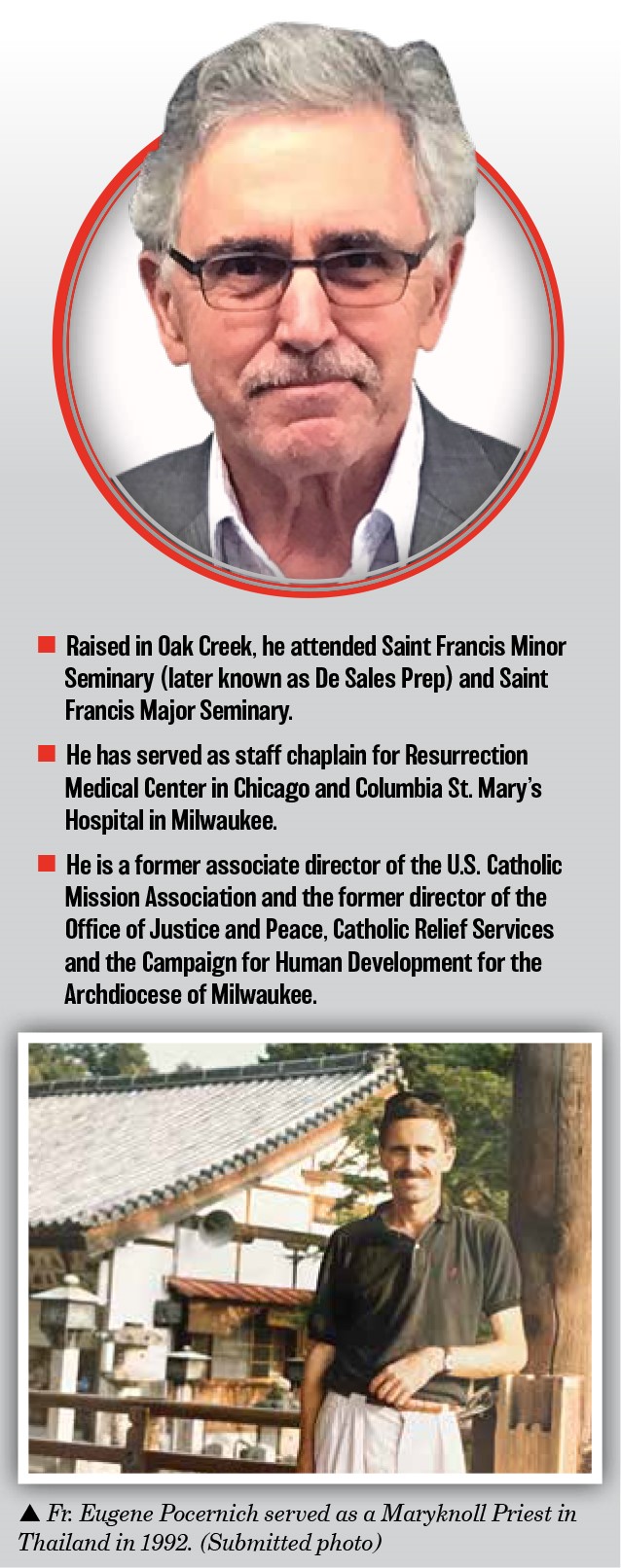Give Us Shepherds
Tell me about your background. Where are you from?
I’m the oldest of nine — two brothers and six sisters. I was born in Kenosha in 1948, and I was baptized at St. James in Franklin and raised in Oak Creek, where my family ran Chickland, which was a short-order restaurant. They ran it for 30 years. Their specialty was fried chicken. We all had good food, and we all had jobs.
How did your vocation to the priesthood come about?
I began high school at Saint Francis Minor Seminary in 1962, just as Vatican II was beginning. Our mother died young, in 1967, and she came down with cancer in 1966 when I had just graduated from high school at the seminary. I was planning to drop out of the seminary but couldn’t tell my parents, so I entered the seminary college in 1966.
What was it that changed your mind?
Well I got a call from the registrar asking, “Are you in or out?” At that point, I was very confused. I said, “I guess I’m in.” That’s how the grace of God works. Had my mother not gotten sick, I would have dropped out. There were two or three more times where I almost dropped out. One of them was right before I was ordained a deacon in 1973. A charismatic person prayed over me after Mass and I went to bed very uncertain as to whether or not I should go ahead with it. When I woke up the next morning, the sun was out, and I had a clear conscience, and I said it’s by the grace of God that I need to be ordained, because he got me through 11 years in seminary. The cloud lifted, and I went ahead with it.
You recently received the 2023 Vision Award from NACPA. What led to your receiving this award?
The seeds of this were planted when I became aware of the 1986 document “Just Treatment for Those Who Work for the Church.” In 2018, I contacted the executive director of NACPA, Dr. Regina Haney, and I helped her in organizing a drafting committee of influential Catholic leaders to produce a second edition of this document.
What does just leadership for those who work in the Church look like, in practice? What can we do in our parishes to promote just treatment of our Church workers?
Really, what it comes down to is that the Church needs to practice what it preaches with Catholic social teaching and labor teaching, because the Church is exempt by separation of church and state from federal labor law. I really hope and pray that human resource directors from across the country will take this document home to their dioceses and set up a meeting with their bishops and encourage them to read it and to implement it, at the diocesan level but also at the parish level.
You have a lot of background in mission and development work. Tell us about some of the more memorable experiences in that ministry.
I was released for five years from 1990-95 to serve as a Maryknoll Priest Associate and was sent to minister in Thailand. It was a challenge in terms of the language, the weather, the culture, but I adjusted very well. The country has 10 Catholic dioceses, so I traveled the country quite a bit on behalf of the Catholic Bishops’ Conference of Thailand, encouraging the bishops to look at issues of tourism, like environmental degradation and the trafficking of women and children. I also worked with the Federation of Asian Bishops’ Conferences promoting interfaith dialogue.
Do you have any hobbies? What do you enjoy doing in your free time?
In my free time, I keep on top of the news by watching cable TV, listening to public radio and reading several publications, including the New York Times, America magazine and Commonweal. I enjoy going to the theater and I’ve also volunteered for a number of years as a cruise ship chaplain, which I recently retired from. Since I was diagnosed with Parkinson’s Disease when I retired seven years ago, I’ve been seeing my neurologist on a regular basis, doing a number of therapeutic exercises.
What is your favorite topic to preach on?
I don’t have a specific favorite topic. I interweave human life and my experiences, what’s going on in the world, with the Scriptures, so I try to integrate that.
Looking back on your priesthood, what strikes you about the time you have spent serving the people of God?
I give thanks to God for the wonderful priesthood I’ve had — for my family, friends, brother priests and lay ministers. As a senior priest, I continue to discern how best to be of service.

